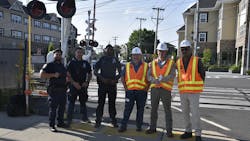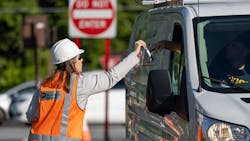MTA, LIRR, Metro-North Railroad collaborate with MTA Police for International Level Crossing Awareness Day
The Metropolitan Transportation Authority (MTA) have partnered with the Long Island Rail Road (LIRR) and the Metro-North Railroad to collaborate with the MTA Police to raise awareness on the importance of railroad crossing safety for International Level Crossing Awareness Day (ILCAD).
The stationed teams distributed grade crossing safety brochures and materials to drivers at 10railroad crossings in the Hudson Valley, Long Island and Connecticut during the busier commuting hours. The activities were part of the railroads’ safety programs known as T.R.A.C.K.S. (Together Railroads and Communities Keeping Safe).
The LIRR and MTA Police, in partnership with the Federal Railroad Administration (FRA), staffed crossings in Farmingdale, Oceanside, Deer Park, Syosset and Bethpage. Metro-North and MTA Police staffed crossings in Peekskill and Chappaqua, New York and Ridgefield, Norwalk and Waterbury, Connecticut in collaboration with the Connecticut Department of Transportation and FRA.
“Safety is the MTA’s highest priority, and events like these help us interact with our riders and the communities they live in,” said Metro-North President and LIRR Interim President Catherine Rinaldi. “We want to remind everyone never to drive or walk around crossing gates in the down position, as trains can come at any time from either direction and can take a mile or more to stop.”
Metro-North and the LIRR have both participated in ILCAD since 2016. ILCAD aims to raise awareness about the dangers associated with the road/rail interfaces known as level crossings or grade crossings. It is a joint global commitment to raise public awareness on the dangers of unsafe behaviors at level crossings. The first European Level Crossing Awareness Day was held on June 25, 2009, with participation from 28 countries and has since expanded participation to more than 40 countries worldwide.
The LIRR and Metro-North T.R.A.C.K.S. programs are community outreach initiatives to educate people about safety on and near railroad grade crossings and tracks. The programs include delivery of safety presentations on-site to schools, businesses and community groups and communications campaigns.

